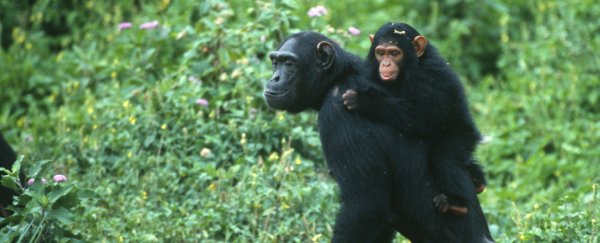Female chimpanzees may not hold the power in their patriarchal societies, but they do know how to protect themselves and their offspring.
Watching from the sidelines, female chimps (Pan troglodytes) are highly sensitive to social changes that may put their babies at risk, new research suggests.
And, to keep their young safe, they have learned when to avoid or manipulate powerful males.
Infanticide, or the killing of babies, is a common albeit disturbing occurrence among chimps, but scientists are still not sure what exact purpose this brutal behaviour serves.
"Watching chimps killing infants is really shocking and although it's pretty well reported, it's not been entirely clear why they do it," says lead author Adriana Lowe, a researcher in female chimp behaviour at the University of Kent.
The sexual selection hypothesis suggests that because male chimps do not kill their own offspring, infanticide must be about ensuring social and genetic prowess.
By killing another chimp's baby and replacing it with one of their own, a male chimp can rise through the ranks of society, which are in large part based on mating access and success.
But if, for whatever reason, a male rises quickly through the ranks, he is likely to be surrounded by babies that are not his.
According to the sexual selection hypothesis, that scenario would assumedly pose an extra risk for mother chimps and their babies in the community.
This was the assumption that Lowe and her team set out to investigate. They collected data on the social behaviour of female chimps in the Budongo Forest, Uganda, a region where infanticide is especially common.
In this ultra competitive environment, it appears that female chimps are highly tuned-in to the power dynamics of their community.
Comparing the behaviour of female chimps from a time of relative social stability and a time of relative instability (where a male rises rapidly through the ranks), the researchers found that female chimps are far more socially defensive in the latter scenario.
The period of social upheaval occurred when a mid-ranking male chimp began to rise through the ranks. During this time, mother chimps, and especially those with younger and more vulnerable infants, were more likely to avoid this power-hungry and dangerous character.
By keeping away, the mothers were trying to limit the risk of infanticide should the mid-ranking male chimp take offence to their offspring.
But they also had another tactic. The mothers were found to befriend male chimps with a stable high rank during social instability - a powerful manoeuvre that could potentially ensure the protection of their offspring from another aggressor.
Not only is this a fascinating insight into how socially intelligent our closest living relatives are, it is also exactly what the researchers expected to see if the sexual selection hypothesis was correct.
"The mothers' behaviour in our study supports the hypothesis that [infanticide] is a strategy by the males to get more mating opportunities," says Lowe.
"Male chimps are often described as great politicians as they use complex alliances to compete for high rank but this shows that the females are just as tuned in to the social environment, watching the males from the side-lines, sensitive to any changes which might put their babies in danger."
This study has been published in the American Journal of Physical Anthropology.
